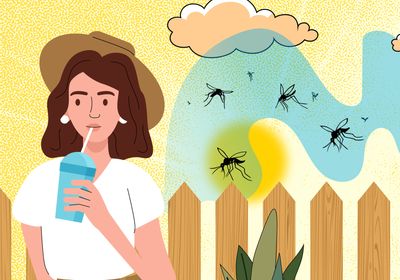Why Do Mosquitoes Bite Some People More Than Others?
Scientists itch to decipher the cues that make some people mosquito magnets.
In 1897, while working in the Indian Medical Service as a medical doctor, Sir Ronald Ross discovered that female Anopheles mosquitoes transmitted malaria. Thanks to this revelation, researchers realized that the threat mosquitoes posed to people was far greater than the itchiness, pain, allergies, or other discomfort caused by their bites.1 Besides malaria, different species of mosquitoes are vectors for diseases such as dengue, yellow fever, West Nile fever, and chikungunya, and are responsible for millions of deaths worldwide every year.2 In their quest to reduce the mosquito population and prevent mosquito-borne diseases, researchers noticed a curious phenomenon: some people get bitten more by mosquitoes than others.
Why Do Mosquitoes Love Me?
Female mosquitoes are attracted to certain people due to a combination of factors, including heat, carbon dioxide, and odors that humans emit based on their genetics, skin microbiota, diet, and other conditions. |
Only female mosquitoes bite people, and they prefer certain individuals over others. Systematic studies from the mid-twentieth century to today shed light on mosquito preference.2 In the 1950s, scientists placed human-shaped, water-filled steel tanks, dressed in a shirt or vest, in a forest and counted how many times mosquitoes landed on them under various conditions.3 They found that mosquitoes were more attracted to tanks that were heated to the temperature of human skin, that released carbon dioxide, or that were wearing clothing soaked in human sweat. Subsequent studies showed that mosquitoes strongly preferred human odors over animal odors and that carbon dioxide sensitized mosquitoes to the presence of skin odors.4,5
Decoding Mosquito Odor Preferences
While chemical and physical cues such as vision, smell, heat, and humidity help female mosquitoes orient toward their targets, certain body odors attract them to specific hosts. Some researchers suggest that resident skin bacteria play a role in developing these odors. “Our skin is covered in bacteria that emit volatiles that vary from person to person,” said Meg Younger, a neuroscientist at Boston University. “This difference in odor between people accounts for the difference between the attraction of mosquitoes to different people.”

Researchers found out that mosquitoes detect the volatiles from the skin using olfactory receptors in their antennal olfactory receptor neurons.6 However, because human odor comprises hundreds of different volatile chemical molecules, decoding which odor profiles mosquitoes prefer remains a difficult task. Despite the challenge, Younger and her colleagues showed that aldehydes from human odor selectively generated strong and prolonged neuronal activity in an olfactory glomerulus.4 Moreover, they found that a less-selective glomerulus showed no or weak response to animal odor, but had a strong response to human odor, which could draw mosquitoes to humans from a long distance.
Other Contributing Factors That Attract Mosquitoes
Studies suggested that in addition to skin microbiota, other factors that can alter body temperature, emission of carbon dioxide, ammonia, and lactic acid, such as pregnancy, infection with malaria parasites, diet, and genetics, can make some people more attractive to mosquitoes.7 For example, to study a potential genetic component, researchers assessed how attracted mosquitoes were to volatiles collected from twins.8 They found that mosquitoes were similarly attracted to compounds taken from identical (monozygotic) twins compared to fraternal (dizygotic) twins.
The odor profile that the bugs prefer also varies among mosquito species. While Anopheles gambiae and Aedes aegypti are strongly attracted to carbon dioxide, ammonia, and lactic acid, Culex quinquefasciatus preferred ethylene glycol and heptanal in addition to carbon dioxide.
Species | Attractants/ Chemical Cues |
Anopheles gambiae | Carbon Dioxide, Ammonia, L-(+)-Lactic Acid |
Aedes aegypti | Carbon Dioxide, Ammonia, L-(+)-Lactic Acid |
Culex quinquefasciatus | Carbon Dioxide, Ethylene Glycol, Heptanal |
How to Prevent Mosquito Bites

To avoid mosquito bites, researchers recommend using mosquito netting, wearing protective clothing, or better yet, staying indoors when mosquitoes are most active.10 A light spray of N, N-diethyl-3-methyl-benzamide, commonly known as DEET, or other chemical repellents on clothes or exposed skin can reduce the number of mosquito bites, though excessive exposure, inhalation, and ingestion of these compounds can cause neurotoxicity and other health problems.
Because plant-based compounds are relatively safe, inexpensive, and often abundant, many researchers studied plant extracts or oils as mosquito repellents.11 They found that Ligusticum sinense extract offered complete protection for up to 11.5 hours while essential oils from lavender, camphor, and many other plants offered protection for 8 hours against some mosquito species.
Meanwhile, researchers are trying to find novel and more effective ways to reduce the mosquito population, such as deploying toxic sugar baits, new insecticides, and biological control measures through genetic manipulation.2
See also "
References
- Ross R. On some peculiar pigmented cells found in two mosquitos fed on malarial blood. Br Med J. 1897;2(1929):1786-1788.
- Dahmana H, et al. Mosquito-borne diseases emergence/resurgence and how to effectively control it biologically. Pathogens. 2020;9(4):310.
- Brown AW. Factors in the attractiveness of bodies for mosquitoes. Nature. 1951;167(4240):202.
- Zhao Z, et al. Mosquito brains encode unique features of human odour to drive host seeking. Nature. 2022;605(7911):706-712.
- Dekker T, et al. Carbon dioxide instantly sensitizes female yellow fever mosquitoes to human skin odours. J Exp Biol. 2005;208(Pt 15):2963-2972.
- Konopka JK, et al. Olfaction in Anopheles mosquitoes. Chem Senses. 2021;46:bjab021.
- Ellwanger JH, et al. Variability in human attractiveness to mosquitoes. Curr Res Parasitol Vector Borne Dis. 2021;1:100058.
- Fernández-Grandon GM, et al. Heritability of attractiveness to mosquitoes. PLoS One. 2015;10(4):e0122716.
- Coutinho-Abreu IV, et al. Human attractive cues and mosquito host-seeking behavior. Trends Parasitol. 2022;38(3):246-264.
- Vander Does A, et al. Update on mosquito bite reaction: Itch and hypersensitivity, pathophysiology, prevention, and treatment. Front Immunol. 2022;13:1024559.
- Asadollahi A, et al. Effectiveness of plant-based repellents against different Anopheles species: a systematic review. Malar J. 2019;18(1):436.


